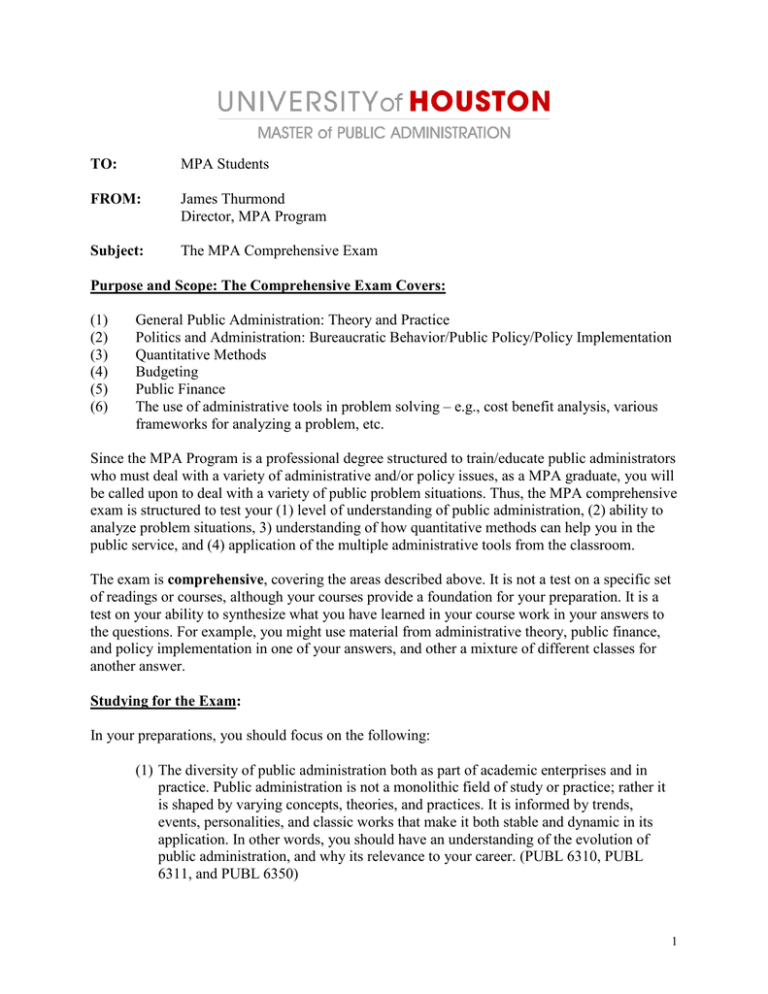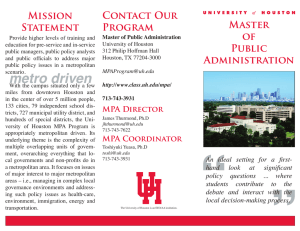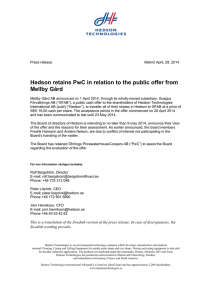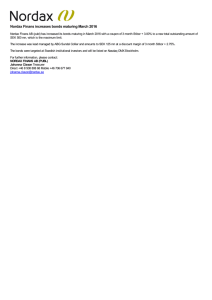TO: FROM: Subject:
advertisement

TO: MPA Students FROM: James Thurmond Director, MPA Program Subject: The MPA Comprehensive Exam Purpose and Scope: The Comprehensive Exam Covers: (1) (2) (3) (4) (5) (6) General Public Administration: Theory and Practice Politics and Administration: Bureaucratic Behavior/Public Policy/Policy Implementation Quantitative Methods Budgeting Public Finance The use of administrative tools in problem solving – e.g., cost benefit analysis, various frameworks for analyzing a problem, etc. Since the MPA Program is a professional degree structured to train/educate public administrators who must deal with a variety of administrative and/or policy issues, as a MPA graduate, you will be called upon to deal with a variety of public problem situations. Thus, the MPA comprehensive exam is structured to test your (1) level of understanding of public administration, (2) ability to analyze problem situations, 3) understanding of how quantitative methods can help you in the public service, and (4) application of the multiple administrative tools from the classroom. The exam is comprehensive, covering the areas described above. It is not a test on a specific set of readings or courses, although your courses provide a foundation for your preparation. It is a test on your ability to synthesize what you have learned in your course work in your answers to the questions. For example, you might use material from administrative theory, public finance, and policy implementation in one of your answers, and other a mixture of different classes for another answer. Studying for the Exam: In your preparations, you should focus on the following: (1) The diversity of public administration both as part of academic enterprises and in practice. Public administration is not a monolithic field of study or practice; rather it is shaped by varying concepts, theories, and practices. It is informed by trends, events, personalities, and classic works that make it both stable and dynamic in its application. In other words, you should have an understanding of the evolution of public administration, and why its relevance to your career. (PUBL 6310, PUBL 6311, and PUBL 6350) 1 (2) The application of theory to practice: You are in a professional degree program. After you graduate, you will deal with practical problem situations. Therefore, one or more parts of the exam ask you to apply theory to practice. (All the classes.) (3) How you go about solving a problem, addressing an issue, and/or developing a policy. (All the classes but in particular PUBL 6311, PUBL 6313, PUBL 6350, PUBL 6410, and PUBL 6415) (4) Making an argument in your answers. (PUBL 6311, PUBL 6350, and PUBL 6415). (5) Budgeting (6) The role of economic rationale and economic theory in public administration including decisionmaking, policymaking, managerial behavior, public behavior, and political behavior. (PUBL 6312 and PUBL 6313) Exam Content: You should expect the following types of questions on the exam: (1) One question on the general history and evolution of public administration, including organization theory. Why is bureaucratic reform a continuous enterprise? Why do reforms seem to rely on the bureaucratic model (e.g., hierarchy, professionalism, etc.) as the guide to change even when it has been found to be dysfunctional? Why do both government and governance matter to public administrators? (2) One question on the relationship of theory to practice. What social/economic/political concepts inform the practicing public administrator? What internal organization structure/processes shape the work of the public administrator? How do they influence the work of public administrators? Numerous examples and cases illustrate the linkage between theory and practice. You will be asked to apply your understanding of public administration theory to an event, issue, problem, or case. (3) One question on bureaucratic politics/policy, focusing on policy implementation and evaluation. This may include question(s) on policy analysis/evaluation as well as processes. (4) One question on quantitative methods to demonstrate your understanding of the importance of assessing the reasoning and/or evidence in a report, the proper techniques for data collection, data analysis, and communicating the results. Also, you should be able to demonstrate that you are a “consumer of statistical analysis.” (5) One budgeting related question. (6) One public finance question to demonstrate your understanding of the effects of government fiscal decisions on the private sector, essential economic concepts, and 2 about public sector finance issues such as efficiency and equity properties of various taxes and user fees. Taking the MPA Exam: The exam takes a full-day: four hours in the morning and four hours in the afternoon. Detailed procedures for taking the exam will be provided at a later date. You are required to take the exam on a word processor. The exam is given in the fall and the spring. The fall test is generally scheduled in late October or early November and spring test in late March or early April. Early in the semester, Dr. Yuasa will notify students of the scheduled date for the comprehensive exam. You must check in with Dr. Yuasa to sign up for the exam. His approval is required for you to take the exam. 3


